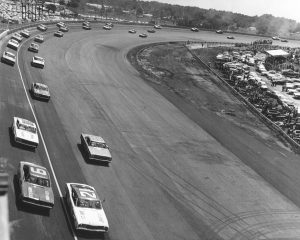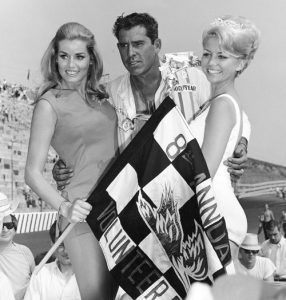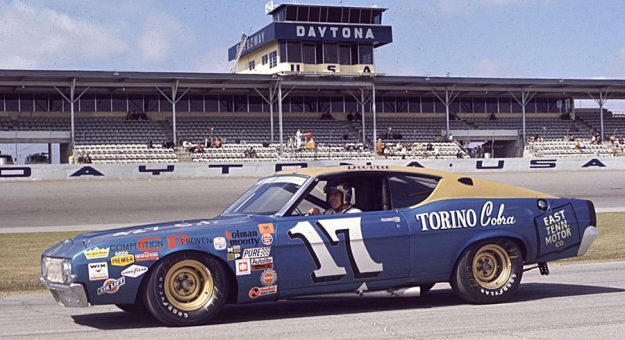Editor’s Note: NASCAR is celebrating its 75th anniversary in 2023. SPEED SPORT was founded in 1934 and was already on its way to becoming America’s Motorsports Authority when NASCAR was formed. As a result, we will bring you Part 21 of a 75-part series on the history of NASCAR as told in the pages of National Speed Sport News and SPEED SPORT Magazine.
What will happen to racing in the future?
The Oct. 16 NSSN report about the withdrawal of Firestone Tire and Rubber Co. from racing left many racing observers asking that question. Most felt Firestone’s Sept. 1967 announcement of a cutback in racing subsidies was a ploy to cool the explosive price war between Firestone and Goodyear Tire and Rubber Co.

If that was Firestone’s intent, the ploy failed. In 1968, conservative estimates placed the two tire companies’ contribution to racing in prizes, tire development, contracts to drivers and other financial assistance at $30 million.
Firestone racing chief W. R (Bill) McCrary found the return on his company’s investment in racing to be unacceptable. “If we go to a major NASCAR race with 1,001 tires and it’s the best tire there — we couldn’t prove it because no one (in the media) would run it,” McCrary lamented. “So it is ridiculous to continue producing racing tires.”
Goodyear, on the other hand, decided to stand pat, but did not rule out the possibility of reducing its support if Firestone remained out of racing. Considering the fact that 39 sets of Goodyear tires parked in victory lane in 1968, versus only seven for Firestone racing tires, the status quo reigned at Goodyear, for now.
However, the Oct. 16 edition added a caveat for NASCAR: “It appears that the tire companies, along with those who produce batteries, spark plugs and other racing equipment are starting to get upset over their expensive role in the sport. Many of them feel that instead of helping racing they’re being asked to support it.”
Pearson And Petty Fight For Supremacy
On the oval battlefields of the Grand National division, David Pearson and Richard Petty fought for supremacy. The defending champion returned to victory lane early and often in 1968. His Plymouth Road Runner pushed to victory 16 times, often with Pearson on his bumper.
However, the now acknowledged “King” of stock car racing and his race team led by cousin Dale Inman “struggled” to capture the right setup for the Road Runner all season. So, while Petty dominated the shorter tracks on the schedule again, he struggled on the points-laden superspeedways and finished the season third in the standings.
In his first full year as a Ford driver, Pearson piloted his Holman-Moody-prepared Torino to victory in the Southeastern 500 at Bristol (Tenn.) Motor Speedway and the Rebel 400 at Darlington (S.C.) Raceway, while collecting 16 checkered flags. The 1966 Grand National champ was runner-up in 12 more races, usually behind Petty or Cale Yarborough.
These 28 strong runs and eight other top-10s propelled Pearson to his second point championship in 1968.
Isaac And Yarborough Enjoy Success
Bobby Isaac and Yarborough also had memorable seasons. A part-time Grand National participant in 1968, Isaac drove his Dodge Charger to 36 top-10s and three victories. Isaac beat Petty for second place in the points.

Yarborough only started 21 races, but won six of them. Most impressive were his four superspeedway victories in one season. Yarborough won the Daytona 500, the Atlanta 500, the Firecracker 400 and the Southern 500. The Mercury Cyclone driver was named Ford’s “Man of the Year” after the season.
As the 1968 season concluded with Tiny Lund as the Grand Touring division champion and Bugs Stevens and Joe Thurman as the Modified and Sportsman titlists, the 1969 season commenced on Nov. 17, 1968 with Petty’s victory in a Macon, Ga., 250-mile feature.
This was Petty’s only victory in a Plymouth for the 1969 season because “Ford has a vast storehouse of knowledge, more than Chrysler has,” Petty said in the Dec. 4 issue of NSSN. Petty had been unhappy with Chrysler’s commitment to Plymouth racing all season, and at one point had requested a Dodge Charger to race, but was denied.
Because he felt Petty Enterprises was being short-changed by Chrysler in terms of factory assistance, the owner of 91 of the 128 Plymouth victories since 1960 became a Ford driver at the end of 1968.
